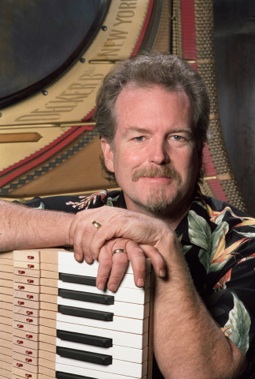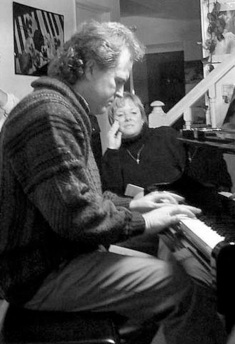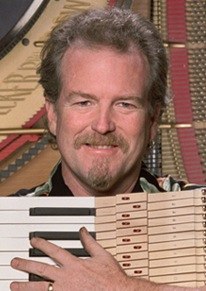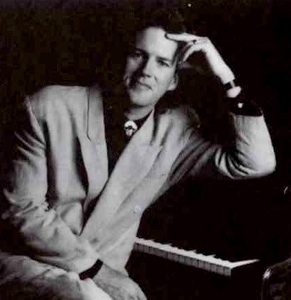
I did my first interview with Spencer Brewer in 1993. I mailed him a list of questions, and he sent me back a tape with his responses (this was before email!). I listened to that tape for the first time while driving, and some of it was so funny that I almost had to pull over, I was laughing so hard! At first, it was a little difficult to match this free-spirit with the gentle pieces I was familiar with (“Dreamgift,” “Where We Used to Play,” “Shadow Dancer,” etc.), but once we got into some depth it was obvious that this was an extremely intelligent and complex man. As a performer, few have his ease onstage both playing the piano and telling stories. His early classification as a “new age” composer indicates only one of Spencer’s many composing styles. Two of his many albums reached #1, and he has toured worldwide. Harsh developments in the music industry and a head-on car crash in ‘99 altered some of Spencer’s previous goals, but he is certainly still a major presence in the piano and music worlds.
Spencer Brewer was born and raised in Dallas, Texas, the first of three boys. Spencer’s mother is a leading dyslexia therapist and his father is an attorney. The only other musician in Spencer’s family was his grandmother, Alma Loveless Gertrude Brewer, affectionately known as “Doody.” She introduced the youngster to boogie-woogie and blues piano, and away he went! Spencer started piano lessons when he was eight, after his mother and grandparents scraped up enough money to buy an old upright. By the time he was twelve, Spencer was sick of piano lessons. He didn’t have good teachers, and was much more interested in improvising and writing his own songs than in learning classical music. He made a deal with his parents that if he continued to spend at least an hour a day at the piano - playing whatever he wanted to play - he could quit taking lessons Spencer wrote his first song when he was nine, and started improvising when he was ten. At twelve, he was actively composing, and he started playing professionally in rock bands at sixteen. He attended college for about a year and a half, majoring first in forestry and then in music. After college, he moved to Austin, Texas, working as a full-time musician. From the ages of 19-22, he played the piano an average of 10-13 hours a day in bars, restaurants, and other gigs. Spencer’s parents never supported his becoming a professional musician, and his father thought he should stay in college and get a “straight job” like everyone else in the family had done for generations.
From his 20’s on, it is amazing that one person could do so many different things and still stay so focused on his music. A few of those endeavors include an import/export business, being a carpenter, floor layer, housepainter, caterer, chef, herb and ginseng salesman, truck driver of cattle, and restaurant-owner. He has had a piano tuning and restoration business for almost thirty years, and now owns a piano/music store in Ukiah. Spencer says that he has played the piano in every kind of establishment imaginable. Some of the more colorful ones include an airplane, a cruise ship, Miss America and Miss Alaska pageants, vineyards, a nudist camp, on the side of a 12,500’ mountain, and a redwood forest. For awhile, he was a chef and piano player on the Mississippi Queen riverboat. Ten years ago, he built a state-of-the-art recording studio on his property, and founded Laughing Coyote Productions.
Spencer moved to California in 1981, and had a piano shop in Pleasant Hill from 1981-1984. Then he and his family moved to their ranch in Redwood Valley, CA. As diverse as his life has been, it is no wonder that Spencer’s musical inspirations have also been varied. Some of his musical influences include the early electronic musicians, Beaver and Krause, Bernard Hermann, The Beatles, Jimi Hendrix, and Oregon, along with early jazz pianists such as Memphis Slim, Meade Lux Lewis, Oscar Peterson, and Art Tatum. He also really enjoys the music of the French Impressionists.
To date, Spencer has played on more than fifty recordings - seventeen solo and duet albums and many compilations. His music has been featured internationally on television, the Olympics, and airlines, and he has composed theme songs for several organizations, two musicals, and has done soundtrack work. Once a motivating force in his life, Spencer no longer feels the compelling need to perform or release albums every year. He enjoys playing with musician friends and performing locally, and spends much of his time working at his music store.
When it comes to composing, Spencer has no boundaries for his inspiration. Sometimes he dreams the music, and if he can wake up and get to the piano fast enough, he can play the whole song. A head-on car wreck in November 1999 left Spencer unable to play the piano for about six months, and he lost his desire to compose for almost a year. He still isn’t composing as prolifically as he used to, but says his newer music is deeper and more soulful. He promises to play some of his new work at our workshop in September.
The following interview was done by phone in August 2005:
KP: What have you been up to the past four years?
Brewer: Two years ago, the owner of a local piano store, The Ivory Palace, decided that she wanted to retire. The store had been here for twenty-one years, and she was the Yamaha dealer for Mendocino and Lake Counties. She approached me to buy it since, at one time, I had the piano shop in the back of the store and had helped her set up her used piano business. I was too involved with HighWired, a high-tech company I founded, and was still doing production at the studio. She told me that if I wouldn’t do it, no one would, and she’d have to close the store. I asked my son if he wanted to be a part of it, and he said he would if I would. Then we asked the local sheet music and music book dealer who has had another store for twenty-two years, and he also said he would if I did, so the three of us bought the store. We changed the name to The Ukiah Music Center (ukiahmusic.com), and now it’s the biggest music store in three counties. We are the only piano dealer of our size in four counties and we also have guitars and other musical stuff. I manage the store, so I still restore, buy, sell, anything that has to do with the piano, including all of the piano moving, which is something I never thought I’d do.
Tonight is the last of the Sundays in the Park concert series - I’ve been doing that for fourteen years now. It’s the concert festival that happens throughout the summer up here in Ukiah. It’s free to the public, and I book anything from regional to national acts. We average 3000-5000 people at every concert! We’ve gotten a couple of governor’s awards, were voted “the best free entertainment in Mendocino County” for twelve years, and the city council finally voted it the #1 community-building event in the history of the city! It’s a very big deal up here.
KP: Do you play at some of the concerts, too?
Brewer: I played three times in the early years, but I haven’t played since around ‘97 or ‘98. You really need a band to be heard in the park, and that’s a lot of work.
I recently started a radio show that’s called “The Wide World of Pianos.” The third one is coming up, and it’s on the first Wednesday of every month on KZYX, a local NPR station. It’s a two-hour show, and I focus on everything that has to do with pianos, from the manufacturers and piano history to various players and composers to weird stories. The first show was about Cuban classical composers from the 19th and 20th centuries. I had great reviews on that show. I talked about what pianos were like in Cuba, what’s there now, and what’s happened since Castro. The second show was about barrelhouse and boogie piano players from the 20’s and the 30’s. I’m going to do an extension of that show next time because I had so much material and such a great response. You can go to KZYX.org and get the live feed. It’s the first Wednesday of every month from 10 AM-noon.
We just did a retrofit at the studio here {Laughing Coyote}. It took three months and we redid the whole thing, going much more high-end in the digital format. For several years, I was producing an average of 20-25 albums a year, but I gradually got out of the production end of it. We’re also building up the library for HighWired (highwiredinc.com), which was the company that I put all of my energy into a few years ago. I quit HighWired last summer, but the company is still going. At the end of all this, I started feeling that I had some music that had never gotten out like some of the boogie and jazz stuff and music I’ve written for film scores, and there are pieces that have done very well worldwide over the years that I’d like to redo with the production head that I have now. The last solo album I did was thirteen years ago (“Romantic Interludes”). I was floored when I realized that. I’ve done albums with other people, but I’ve mostly been in production. So I started working on my own music again, and I’ve got enough material for two records sitting here. All but one of the piano tracks are finished. Todd Philips came in and did all of the bass parts, Paul McCandless is doing all of the winds, and The Turtle Island String Quartet is doing the strings. I’m going slowly and doing it right. For eleven years, by contract, I could not re-record any of my own work. That time is up, so I’m redoing a few of the old favorites. Narada still owns my masters, but now I can re-record my music. I have to pay them royalties to do it, but I’m okay with that. I’d have to say that most of what I do now is the store and working on pianos. I’m way into the whole thing around pianos at this point.

Kathy watching Spencer at a house concert
KP: That’s where you started, too.
Brewer: Yeah, I was doing the music simultaneously with the piano trade. Now the music has taken a back seat and the piano trade has come to the forefront. Who knows what will happen with this record? I’m not thinking about it because I don’t care anymore. Maybe because I don’t care, something interesting will happen!
We still put on several other concerts and festivals up here. You would love The Professional Pianists Concert. We’re in our fifteenth year, and we’re now selling out two 500-seat halls. Last year, we sold out every performance. I’ve never seen it done anywhere else in the nation, but I think it would be a great paradigm for any city to do it. You take about a half dozen of your best local players, each with a different style. There’s no competition - none, zero - onstage. Everybody has a body-mic, and the stage is set up to look like a living room - two or three couches, chairs, lights, and plants all over the stage. There are two grand pianos back to back. We all come out and are onstage the entire concert. All we know is who is going to start the concert and who is going to end it. We have no idea of who is going to play or what they’re going to play in the middle. We’ll sit there and converse about experiences with piano gigs, tell stories, and anything that comes to mind. The audience just goes nuts because there is so much humor and a real sense of camaraderie among the players. One player will get up and just blow everybody out of their chairs with how outrageous she is. She’ll sit down and we’ll talk a little bit, and then the next guy will get up and play something completely different. What’s so beautiful about it is that no matter who stands up and plays, it’s a totally different style and a completely different way of playing and interpreting piano music. The audience gets the sense that everybody is good, everybody has something to contribute, and it really is about the music, not competition or about who is better. If someone plays a really outrageous piece, all of us will stand up and bow to them like they’re God onstage. Then we’ll talk about what that’s about, and the audience just loves it. I think that could be such a big cultural deal for communities around the country. You just have to have somebody in the lead who truly believes that music is not about competition - that’s the most important thing.
Over the years, the local boogie woogie king, Ed Reinhart, and myself have gone onstage and done two musical productions. One was called, “Please Don’t Shoot the Piano Player,” and the other was “Dueling Pianos.” The first one was set in a saloon in the 1800’s, and the second was in the 1920’s in a Chicago mobster’s speakeasy. They’re comedy-driven, but Ed and I actually duel in various styles to see who is the better piano player. The next production, which is currently being written, is called “Drooling Pianos.” We’re both in our eighties in a convalescent home. Our band was supposed to play Woodstock in 1969, but we never made it because we were smoking too much mendo bendo and ended up in Stockwood, New Jersey! One of us has dementia, and the other is in one of those little electric carts, but it will only turn left. The story is about putting back together the original band - we’re all in our 80’s and early-90’s - to go and play the 50th anniversary of Woodstock. The year is 2019.
KP: Where is it going to be staged?
Brewer: It’s going to be on the main stage at the local playhouse the last three weekends of April 2006. Isn’t it a great idea?
KP: It sure is! Who is writing it?
Brewer: Andrew Kircher, who is originally from this area. He had an incredible talent for comedy, writing, and staging, even at an early age. He won the national Youth Comedy Writing Award twice in a row, and then went down to UCLA in the theater department. Now he’s living in New York, heading up an improv theater off-Broadway. What he really likes to do is write comedy, so he’s writing the script for this thing right now. Ed and I came up with the concept, but he’s the one who’s writing about what’s going to happen and all of the various characters.
KP: Which two of your albums were #1?
Brewer: “Piper’s Rhythm” (1991) and “Dorian’s Legacy” (1989), which was on the charts about three months. “Piper’s” was on there for almost nine months, and is what made me do most of the worldwide touring that I did. The whole music market is nothing like when I started. It’s not even in the same universe. That’s fine, I’m not interested in it anymore. I’ve been there and done that, and it was a great ride. I have no regrets, and I feel like what little I’ve written recently is deeper and more soulful than what I wrote in the past. It’s just different. I still do what I do, but I’m just not into the game of it. I still l have a lot of people all over the country emailing me regularly, asking when I’m going to come and play, but I’m not going to do it unless a promoter is willing to set it up. I keep thinking that it would be fun to create a network and of “parlor concerts.” It would be a lot of work and would take several years to set up, but it would go back to the original way that all concerts were done - in people’s living rooms.
KP: Kind of like what I’ve been doing.
Brewer: Exactly what you’ve been doing, but literally creating a network across the nation of people who want various styles of music, and then just plugging the artists into each town. It would probably do well because it’s all grassroots, and that builds pretty quickly.
KP: David Nevue has done some of that, too. If we put you two together, you could be dangerous!
Brewer: The promoter in me will never die. We’ll see where that goes, with you in the middle.
KP: That’s usually where I end up!
Brewer: Two new age guys sandwiching you.
Kathy Parsons
August 2005




